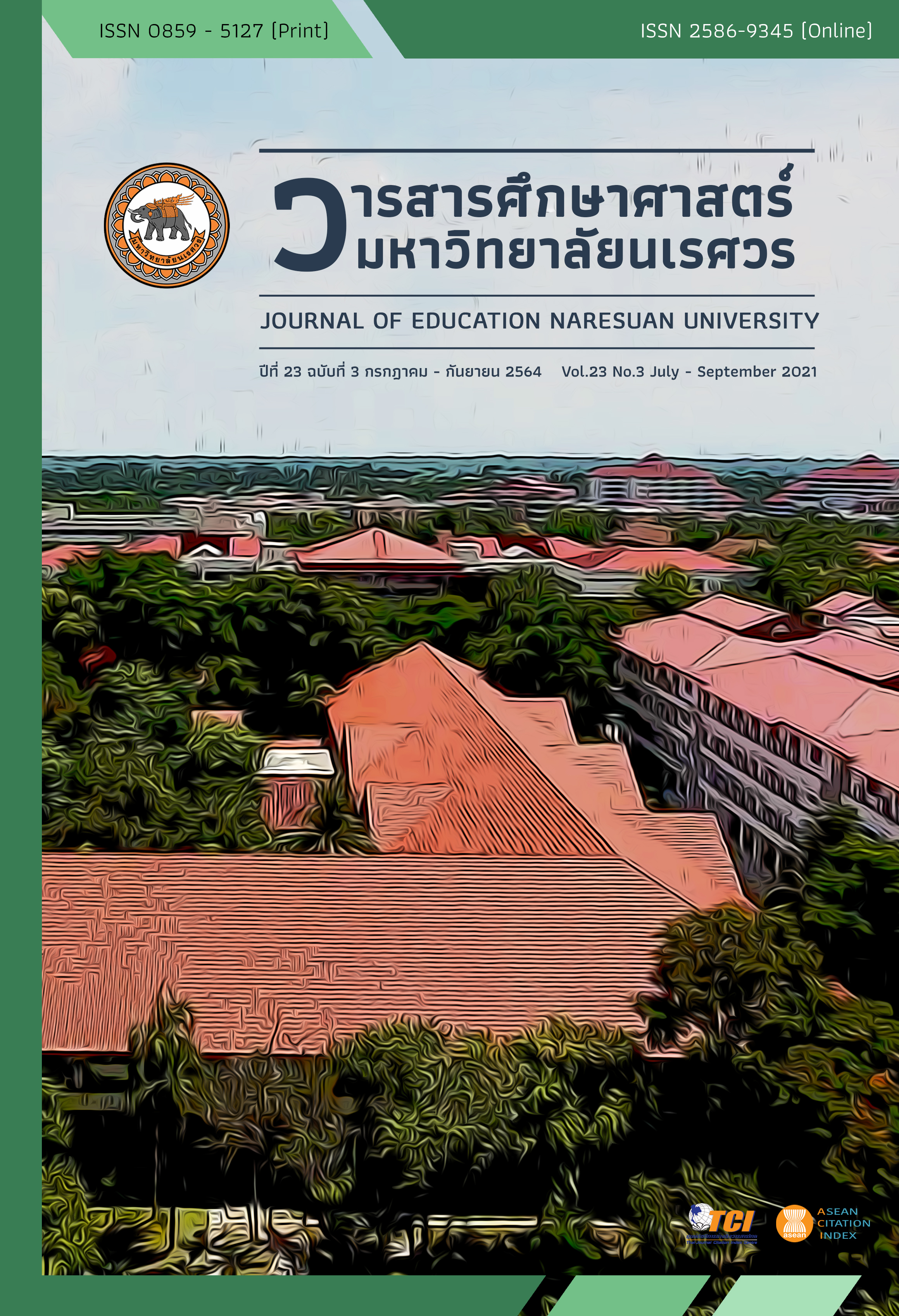EXPERIENTIAL LANGUAGE LEARNING MANAGEMENT TO ENHANCE ENGLISH READING ABILITY AND VOCABULARY RETENTION AMONG MATHAYOMSUKSA 1 STUDENTS การจัดการเรียนรู้ภาษาแบบประสบการณ์เพื่อเพิ่มพูนความสามารถในการอ่านภาษาอังกฤษและความคงทนในการจำคำศัพท์ ของนักเรียนชั้นมัธยมศึกษาปีที่ 1
Main Article Content
Abstract
The purposes of this study were to compare students’ English reading ability and vocabulary retention before and after they had learned through experiential language learning. The sample group was 30 Mathayomsuksa 1 students taking the fundamental English Course (E 21101) at Samoengpittayakhom School, Samoeng, Chiang Mai. The research instruments were 7 experiential language learning lesson plans, an English reading ability test, and an English vocabulary knowledge test. The obtained data were analyzed for mean, standard deviation, and percentage. The results were as follows: 1) the students’ English reading ability increased after learning through experiential language learning, and 2) the students had English vocabulary retention after learning through experiential language learning.
Article Details
The owner of the article does not copy or violate any of its copyright. If any copyright infringement occurs or prosecution, in any case, the Editorial Board is not involved in all the rights to the owner of the article to be performed.
References
Aksaranukhror, S. (1989). Teaching language skills and culture. Bangkok: Chulalongkorn University Press.
Arrirak, K., et al. (2005). Multidisciplinary learning management. Bangkok: Alfa Millennium. [in Thai]
Bloom, B. S. (1956). Taxonomy of educational objectives, the classification of educational goals–Handbook I: Cognitive domain. New York: McKay.
Bureau of Academic Affairs and Educational Standards. (2008). A practical guideline of assessment and evaluation. Bangkok: Ministry of Education. [in Thai]
Eyring, J. L. (1991). Experiential language learning. In M. Celce Murcia (Ed.) Teaching English as a second language or foreign language (pp. 346-359). Boston: Heinle Publishers.
Guy, L. B., & Miles, A. T. (1967). Reading difficulties: Their diagnosis and correction. New York: Appleton Century Crofts.
Honey, P., & Mumford, A. (1982). The manual of learning styles (2nd ed). UK: Maidenhead.
Kolb, D. A. (1984). Experiential learning: Experience as the source of learning and development. Englewood Cliffs, NJ.: Prentice Hall.
Lasuwong, K. (1998). Educational psychology (2nd ed). Bangkok: Sriracha Printing. [in Thai]
Matlin, M. W. (1995). Psychology (2nd ed). Fort Worth, Texas: Harcourt Brace.
Miller, G. A. (1956). The magical number seven, plus or minus two: some limits on our capacity for processing information. Psychological Review, 63(2), 81–97.
Ministry of Education. (2008). The basic education core curriculum B.E. 2551. Bangkok: Kurusapa Printing Ladphrao. [in Thai]
Neryplub, P. (2012). English experiential learning for enhancement of English speaking ability and motivation among mathayomsuksa 3 students (Master thesis). Chiang Mai: Chiang Mai University. [in Thai]
Nunan, D. (1991). Language teaching methodology: A textbook for teacher. Wiltshire, UK: Prentic Hall International.
Pearson, P. D., & Johnson, D. D. (1978). Teaching reading comprehension. New York: Holt, Rinehart and Winston.
Senchaowanich, S. (1999). Techniques for English reading skill and comprehension development for Thai students (10th ed). Bangkok: Thammasat University Press. [in Thai]
Sirikhan, S. (2002). English experiential learning to enhance language skills and content knowledge of mathayomsuksa 4 students (Master thesis). Chiang Mai: Chiang Mai University. [in Thai]
Wangphasit, L. (2016). Coaching for learning English with happiness. Journal of Education Naresuan University, 18(3), 351 – 363. [in Thai]
Wannawati, T. (2005). Action research in English reading for learning development among mathayomsuksa 4 students in Chiang Mai University Demonstration School. Chiang Mai: Chiang Mai University. [in Thai]
Wiboonwachariyakun, L. (2004). Local wisdom-based experiential learning to enhance English oral presentation ability and awareness of local wisdom (Master thesis). Chiang Mai: Chiang Mai University. [in Thai]
Wichadee, S. (2011). Learners' learning styles: The perspectives from the theory of experiential learning. Bangkok: Bangkok University. [in Thai]
Wiwatnanon, S. (2008). Reading, analytical thinking, and writing skills. Bangkok: Fuangfah. [in Thai]


